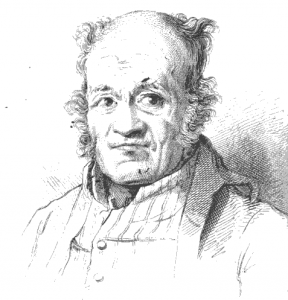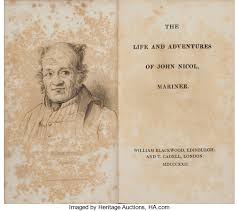 John Nichol, mariner. I would have liked to have known him. Re-reading his episodic memoir (I first read it at sea on a Pacific voyage – the same waters he crossed more than 200 years before) it feels as though I do know him, as if he was an ancestor maybe, or an old lover from a past life. A mariner like Robert Hay, also from a Scottish family but Nichol was of the generation before Hay. Both men mention Robinson Caruso as a favorite novel of their youth.
John Nichol, mariner. I would have liked to have known him. Re-reading his episodic memoir (I first read it at sea on a Pacific voyage – the same waters he crossed more than 200 years before) it feels as though I do know him, as if he was an ancestor maybe, or an old lover from a past life. A mariner like Robert Hay, also from a Scottish family but Nichol was of the generation before Hay. Both men mention Robinson Caruso as a favorite novel of their youth.
Like Hay, John Nicol was literate, sensitive, and observant. He wrote with insight and genuine feeling about those incidents in his life that affected him, that caused him to wonder. Those incidents that changed him — or at least those incidents he remembered years later, as being worth writing about.
Many of John Nicol’s memories include women. He noticed women. He records them in his memoirs, beginning with his mother who died when John was young, giving birth to a fourth sibling, leaving his father, a cooper, to raise five children. He tells an early story of a trip to London with his father. Here, he fought an English boy over a dead monkey floating in the Thames. “I had not seen above two or three in my life. I thought it of great value.“He stripped naked, plunged in the river for it, and had the soggy corpse stripped from his hands by the other boy, whom he fought, naked and wet, and won. His father gave him a beating for fighting and “staying my message; but the monkey’s skin repaid me for all my vexations.”
John Nichol would prove himself to be a lover, not a fighter, some years later aboard a convict transport ship where he fell in love with, protected, and fathered a child with one of the female convicts, Sarah. Every man on board took a wife from among the convicts, he relates. His was Sarah Whitlam, whom he “courted for a week and upwards, and would have married her on the spot had there been a clergyman on board.” Sarah, like many others, had been transported for stealing – her sentence seven years. “I knocked the rivet out of her irons upon my anvil, and as firmly resolved to bring her back to England when her time was out, my lawful wife, as ever I did intend anything in my life. She bore me a son in our voyage out.”
A cooper like his father before him, Nicol served aboard warships, whalers, merchantmen and transports alike. In his journeys he twice circumnavigated. Coopers were in great demand in that century. He served aboard Goliath (74 guns) under Captain Foley in the battle of Aboukir Bay. His station was below-decks, assisting the gunner. He mentions the gunner’s wife as being of good comfort during the battle, bringing them both a drink of wine to fortify them. John tells of several women aboard who did their part. Several of them were wounded in the action and one woman, from Leith, died as a result of her wounds. “One woman bore a son during the heat of action.”
While he relates plenty of masculine action in his adventures, Nicol notices the women everywhere he goes and remarks on them. In doing so he makes them visible to us, and alive. They too, are part of the history. Real women were there, as mothers, mates, wives, lovers, convicts, slaves, prostitutes, passengers — and occassionally disguised as men, working alongside them.
